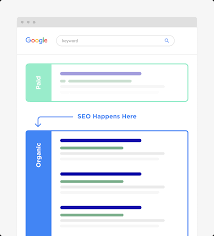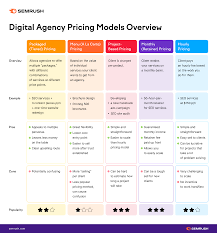The Role of SEM in Digital Marketing
In the realm of digital marketing, Search Engine Marketing (SEM) plays a crucial role in enhancing online visibility and driving targeted traffic to websites. SEM encompasses various strategies, with a primary focus on paid advertising campaigns that appear on search engine results pages.
Key Components of SEM
SEM involves two main components: Pay-Per-Click (PPC) advertising and Search Engine Optimization (SEO). While SEO focuses on optimizing a website to improve organic search engine rankings, PPC advertising allows businesses to bid on specific keywords to display ads prominently in search results.
Benefits of SEM
- Increased Visibility: SEM helps businesses appear at the top of search results, increasing visibility among potential customers.
- Targeted Advertising: With SEM, businesses can target specific demographics, locations, and interests to reach their ideal audience.
- Measurable Results: SEM provides detailed analytics and metrics that allow businesses to track the performance of their campaigns and make data-driven decisions.
- Quick Results: Unlike SEO, which takes time to show results, PPC campaigns can generate immediate traffic and leads for businesses.
Best Practices for Successful SEM Campaigns
- Keyword Research: Conduct thorough keyword research to identify relevant terms that your target audience is searching for.
- Compelling Ad Copy: Create engaging ad copy that entices users to click on your ads and visit your website.
- Landing Page Optimization: Ensure that your landing pages are tailored to match the ad content and provide a seamless user experience.
- A/B Testing: Test different ad variations, keywords, and targeting options to optimize campaign performance over time.
In conclusion, SEM is a powerful tool in the digital marketing arsenal that can help businesses reach their target audience effectively and drive meaningful results. By leveraging the right strategies and continuously refining campaigns based on data insights, businesses can maximise their online presence and achieve their marketing goals through SEM.
Eight Essential SEM Strategies for Enhancing Your Digital Marketing Campaigns
- Understand your audience’s search behaviour by researching keywords that are relevant to your products or services to target them effectively.
- Optimise your landing pages for conversions with clear calls-to-action, engaging content, and fast load times to improve the user experience.
- Use ad extensions in your campaigns to provide additional information like contact details, product links, or reviews which can increase click-through rates.
- Test different ad copies and designs using A/B testing methods to determine what resonates best with your target audience and drives results.
- Set a realistic budget for your campaigns and continuously monitor performance metrics to ensure cost-effectiveness and return on investment (ROI).
- Incorporate negative keywords into your campaign settings to prevent ads from appearing in unrelated searches, reducing wasted spend and improving targeting.
- Keep up-to-date with SEM platform updates such as Google Ads or Bing Ads features as they evolve frequently, offering new tools for optimization.
- Leverage remarketing techniques to reconnect with visitors who have shown interest in your site but did not convert into customers initially.
Understand your audience’s search behaviour by researching keywords that are relevant to your products or services to target them effectively.
To succeed in Search Engine Marketing (SEM), it is essential to understand your audience’s search behaviour by conducting thorough keyword research. By identifying and targeting keywords that are relevant to your products or services, you can effectively reach potential customers who are actively searching for what you offer. This strategic approach not only increases the visibility of your ads but also ensures that they are displayed to a highly targeted audience, ultimately leading to improved click-through rates and conversions. By aligning your SEM campaigns with the search behaviour of your audience, you can enhance the effectiveness of your marketing efforts and drive tangible results for your business.
Optimise your landing pages for conversions with clear calls-to-action, engaging content, and fast load times to improve the user experience.
To enhance the effectiveness of your Search Engine Marketing (SEM) campaigns, it is essential to optimise your landing pages for conversions. By incorporating clear calls-to-action, engaging content, and fast load times, you can significantly improve the user experience and increase the likelihood of visitors taking desired actions on your website. A compelling call-to-action prompts users to engage further with your site, while engaging content keeps them interested and informed. Fast load times are crucial in retaining user attention and preventing potential bounce rates. By focusing on these key elements, you can create a seamless journey for users and maximise the success of your SEM efforts.
Use ad extensions in your campaigns to provide additional information like contact details, product links, or reviews which can increase click-through rates.
By incorporating ad extensions into your SEM campaigns, you can enhance the visibility and effectiveness of your ads by providing valuable additional information such as contact details, product links, or reviews. These extensions not only make your ads more informative and engaging but also increase the likelihood of users clicking through to your website. By offering relevant details directly within the ad, you can capture the attention of potential customers and drive higher click-through rates, ultimately boosting the overall performance of your SEM campaigns.
Test different ad copies and designs using A/B testing methods to determine what resonates best with your target audience and drives results.
To enhance the effectiveness of your Search Engine Marketing (SEM) campaigns, it is essential to employ A/B testing methods to experiment with various ad copies and designs. By testing different variations, you can gain valuable insights into what resonates best with your target audience and ultimately drives superior results. Through A/B testing, you can identify which messaging, visuals, or calls-to-action are most compelling to your audience, enabling you to refine your SEM strategies for optimal performance and engagement.
Set a realistic budget for your campaigns and continuously monitor performance metrics to ensure cost-effectiveness and return on investment (ROI).
Setting a realistic budget for your Search Engine Marketing (SEM) campaigns is essential in maximising their effectiveness. By allocating resources wisely and monitoring performance metrics consistently, businesses can ensure that their SEM efforts are cost-effective and yield a significant return on investment (ROI). Regularly analysing key metrics such as click-through rates, conversion rates, and cost per acquisition allows businesses to make informed decisions, optimise their campaigns, and allocate budget where it generates the most value. This proactive approach not only enhances the efficiency of SEM campaigns but also contributes to long-term success in digital marketing strategies.
Incorporate negative keywords into your campaign settings to prevent ads from appearing in unrelated searches, reducing wasted spend and improving targeting.
By incorporating negative keywords into your SEM campaign settings, you can strategically prevent your ads from appearing in irrelevant searches, thereby minimising wasted spend and enhancing targeting precision. By excluding specific terms that are not aligned with your target audience or offerings, you can ensure that your ads are displayed to users who are more likely to engage with your content. This proactive approach to refining keyword targeting not only optimises budget allocation but also boosts the overall effectiveness of your SEM efforts by focusing on reaching the most relevant audience segments.
Keep up-to-date with SEM platform updates such as Google Ads or Bing Ads features as they evolve frequently, offering new tools for optimization.
Staying informed about the latest updates and features of SEM platforms like Google Ads and Bing Ads is essential for successful digital marketing campaigns. These platforms evolve regularly, introducing new tools and functionalities that can enhance campaign performance and optimization. By keeping up-to-date with these changes, businesses can leverage the latest technologies to stay ahead of the competition, reach their target audience more effectively, and achieve better results in their SEM efforts.
Leverage remarketing techniques to reconnect with visitors who have shown interest in your site but did not convert into customers initially.
By leveraging remarketing techniques in Search Engine Marketing (SEM), businesses can strategically reconnect with visitors who have previously shown interest in their site but did not convert into customers initially. By targeting these potential customers with tailored ads as they browse other websites or social media platforms, businesses can reinforce their brand message, maintain top-of-mind awareness, and encourage return visits to ultimately drive conversions. Remarketing allows businesses to engage with a highly relevant audience segment, increasing the likelihood of turning previous visitors into valuable customers through targeted and personalised advertising efforts.




